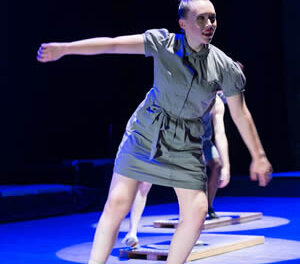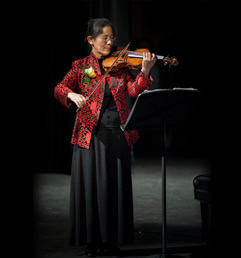The Cantata Singers, a part of the School of Music at the University of North Carolina School of the Arts, presented a beautiful a cappella concert in Crawford Hall on the afternoon of Sunday, April 13. James Allbritten, who has conducted the Cantata Singers for the last 20 years, announced to the crowd that this was his last concert with the Cantata Singers, as he is moving on to become artistic director of the Piedmont Opera. He explained that he wanted his last concert to be entirely a cappella to celebrate the incredible instrument that is the voice.
The concert opened with two pieces by Tomás Luis de Victoria (1548-1611), “O quam gloriosum” and “Vere langueres nostros.” Victoria is among my favorite composers, and these are absolutely stunning pieces that were performed well. The choir, sopranos especially, had heavy vibrato, and I would have liked to hear these pieces with straight-tone at least at the cadences, to be more historically accurate. I had some difficulty hearing the altos throughout these two pieces and the rest of the concert, as there were more than twice as many sopranos as altos. The Latin diction was very well done.
Next up were the Fünf Gesänge, Op. 104, by Johannes Brahms (1833-97). This is a cycle of five songs about a man dealing with mortality. The ensemble’s German diction was impeccable, as were their entrances and cutoffs. The second and fifth songs in this cycle, “Nachtwache II” and “Im Herbst,” were especially lovely.
I was particularly pleased to hear the “Bogoroditse Devo,” from the All-Night Vigil by Sergei Rachmaninoff (1873-1943). Because I have performed this piece, I was finally able to listen for and pick out the alto line. The choir sang with brilliant dynamic phrasing, a requirement for the Romantic nature of the piece. Their diction was, again, almost perfect – though it sounded more like Russian than Church Slavonic, the liturgical language in which the piece is usually performed.
Three Shakespeare Songs by Ralph Vaughan Williams (1872-1958) were performed next. These are strange, ethereal pieces that draw on the mysticism and magic of the Shakespeare plays from which the texts are drawn, The Tempest and A Midsummer Night’s Dream. The group must have spent a lot of time working on the diction, because it was almost perfect in every piece. I could understand every word of these three songs without the help of the program, where the texts were printed. The balance of the choir finally evened itself out, and the alto line became more prominent in the harmonic structure.
The performance of “Alleluia,” by Randall Thompson (1899-1984), was stunningly beautiful. The dynamics swelled and the harmonies were lush. The ensemble was perfectly balanced (probably because Allbritten kept indicating for the giant soprano section to sing softer). Everything went right with this piece.
The concert was wrapped up with a set of three American spirituals – “Hark, I Hear the Harps Eternal,” arranged by Alice Parker (b. 1925), and “There is a Balm in Gilead” and “Ezekiel Saw the Wheel,” both arranged by William L. Dawson (1899-1990). These energetic pieces were the perfect way to end the concert. Each had a soloist: Alicia Reid, soprano, sang in the first piece, Joyner Horn, soprano, the second, and David Maize, tenor, the third. Reid was a bit quiet, but both she and Horn had nice tone – both seemed to be budding opera singers. Maize had a wonderfully bright, spinning tenor sound; I would have loved to hear him sing more.
For upcoming performances, see our calendar.












